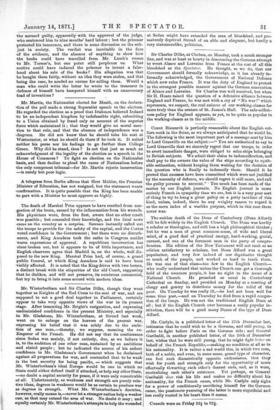Mr. Winterbotham and Sir Charles Dilke, though they went together
as Knights of the Red Cross to the seat of war, and are supposed to act a good deal together in Parliament, certainly Appear to take very opposite views of the war in its present stage. After lamenting Mr. Bright's resignation, and expressing undiminished confidence in the present Ministry, and especially in Mr. Gladstone, Mr. Winterbotham, at Stroud last week, went on to enlarge on the horrors of the present war, -expressing his belief that it was solely due to the ambi- tion of one man,—thereby, we suppose, meaning the ex- Emperor of the French. He did not say that its continuance -since Sedan was mainly, if not entirely, due, as we believe it is, to the ambition of one other man, sustained by an ambitious and elated people ; but he indicated the source of his ardent -confidence in Mr. Gladstone's Government when he declaimed Against all preparations for war, and contended that to be weak as the beat security for being pacific, which suggests that Mr. Winterbotham's ideal Europe would be one in which no State could either defend itself if attacked, or help any other State, —no doubt a capital security for peace, if it were only conceivable at all. Unfortunately, as weakness and strength are purely rela- tive ideas, degrees in weakness would be as certain to produce war as degrees in strength. What Mr. Winterbotham's doctrine, however, really means is,—never let a stronger nation help a weaker one, as that may extend the area of war. No doubt it may ; and equally certainly Mr. Winterbotham's attempts to help the wounded
at Sedan might have extended the area of bloodshed, and pre- maturely deprived Stroud of an able and eloquent, but hardly a very statesmanlike, politician.


































 Previous page
Previous page